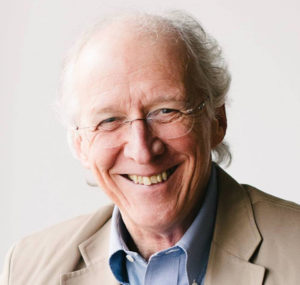Evangelical author John Piper says an “egalitarian myth” that men and women are defined by their “competencies” rather than gender role is partly to blame for the #MeToo revolt against sexual abuse by powerful men.
Piper, a leader in the neo-Calvinist movement, said in a podcast March 16 that “egalitarian assumptions in our culture” over the last 50 years have muted “one of the means that God has designed for the protection and the flourishing of women.”

John Piper
Piper, founder of Desiring God ministries, said the notion that males and females deserve equal opportunities in church, job and home “has silenced the idea that men as men — by virtue of their created, God-given maleness, apart from any practical competencies that they have or don’t have — have special responsibilities to care for and protect and honor women.”
The former pastor of Bethlehem Baptist Church in Minneapolis said 50 years of ignoring traditional gender roles is “one of the seeds bearing very bad fruit,” including a recent rash of powerful men exposed for making unwanted sexual advances on women under their authority in Hollywood and politics.
Piper, scheduled to speak next month alongside Southern Baptist Convention leaders Albert Mohler and David Platt at the 2018 Together for the Gospel conference in Louisville, Ky., was lead drafter of the Danvers Statement, a 1987 document outlining what is today known as the “complementarian” view of interpreting Scripture.
Guiding document for the Council on Biblical Manhood and Womanhood, the Danvers Statement addresses, among other things, “widespread ambivalence regarding the values of motherhood, vocational homemaking and the many ministries historically performed by women.”
It teaches that while equally bearing God’s image, men and women were created for different and complementary roles in the home, church and society. It provides the theological basis for an article in the Baptist Faith and Message assigning the husband “the God-given responsibility to provide for, to protect, and to lead his family” and the wife to “submit herself graciously” to his “servant leadership.”
“She, being in the image of God as is her husband and thus equal to him, has the God-given responsibility to respect her husband and to serve as his helper in managing the household and nurturing the next generation,” according to Article 18 of the Southern Baptist Convention’s official faith statement, last amended in 2000.
Piper said millions of people today “would rather sacrifice this peculiar biblical mandate given for the good of women” than to “betray any hint of compromise with egalitarian assumptions.”
“We have put our hope in the myth that the summons to generic human virtue, with no attention to the peculiar virtues required of manhood and womanhood, would be sufficient to create a beautiful society of mutual respect,” he said. “It isn’t working.”
In a written column making similar arguments last November, Piper lamented a “torrent or avalanche” overtaking traditional understanding of gender roles.
“One need only sample the movies and TV shows of recent years to see the increasing passion with which women are portrayed as being just as physically strong, harsh, impudent, violent, arrogant, vulgar, two-timing, and sexually aggressive as any macho male hero,” Piper observed.
“One wonders if this passion for the portrayal of Annie Get Your Gun on steroids is perhaps owing to the rising sense that there is something in nature that won’t adapt to our egalitarian portrayal,” he continued. “The stubbornness of God-given nature, then, creates the need for the egalitarian message to be more forceful, even preternatural (Wonder Woman, Catwoman, Superwoman). Such are the trials of those who try to recreate what God made otherwise.”
Piper recently sparked debate in complementarian circles when he said women should not teach in seminary courses preparing for the pastorate, because that role “is biblically designed for spiritual men.”
Piper said in 2010 “it can be” biblically acceptable for a mother to hold a full time job outside of the home, but he discouraged it “because mothering and homemaking are huge and glorious jobs.”
Piper said younger women should not think, “If I don’t get a career and make lots of money and be equal with men in pay and time and everything, I’ve somehow sold out to something small or something that doesn’t require intellectual capabilities.”
“It is a great and glorious calling to be a mother and a homemaker and a wife and a neighborhood make-it-happen kind of person and a church minister,” he counseled. “Who knows what God might be pleased to do?”
Dorothy Patterson, professor of theology in women’s studies at Southwestern Baptist Theological Seminary, made similar arguments in her chapter of Recovering Biblical Manhood and Womanhood, a 1991 book co-edited by Piper and Phoenix Seminary professor Wayne Grudem.
“Too many women rush headlong into a career outside the home, determined to waste no time or effort on housework or baby-sitting but rather seeking to achieve position and means by directing all talents and energies toward non-home professional pursuits,” she wrote.
Patterson, wife of seminary president Paige Patterson, said when a wife goes to work outside the home, her husband and children can go into “culture shock.”
“Suddenly the husband has added to his vocational work increased family assignments,” she warned. “He is frustrated over the increase of his own assignments and guilty over his wife’s increased fatigue and extended hours to keep up at home.”
“God did give the husband the responsibility of providing for the family,” Patterson wrote. “To sabotage his meeting that responsibility is often a debilitating blow to the man personally and to the marriage.”
